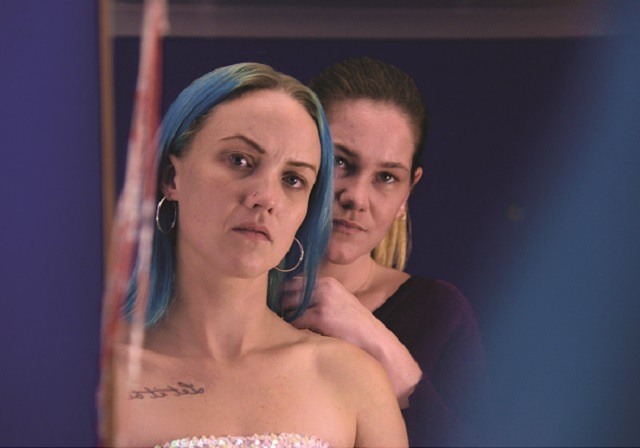
One of the conclusions one can get from this year’s LFF is that, judging by the large number of notable first features premiered, a new generation of British filmmakers is making its way into the industry. Such excellent works as ‘Saint Maud’ by Rose Glass, which we already reviewed and was selected for the official competition; Fizal Boulifa’s depiction of working class life in ‘Lynn + Lucy;’ the psychological thriller ‘Make Up’ by Claire Oakley; the violence among a family of Irish drug dealers as told in Nick Rowland’s ‘Calm With Horses’ and, not exactly a debut but equally accomplished, ‘Nocturnal,’ the first narrative feature by former documentarian Nathalie Biancheri, show no shortage of fresh talent in UK cinema.
Having Ken Loach’s production company Sixteen Film as a partner, one could easily classify Fizal Boulifa’s ‘Lynn + Lucy’ in the same branch of social realism. The young director, whose previous short films had been well received in the most prestigious international festivals, insightfully depicts contemporary working class England, set in an average social housing neighbourhood of a small town, looking at the lives of two long-time best friends. But what could have been just another well-observed family drama evolves into tragedy and multi-layered complexity with the dead of Lucy’s recently born baby under signs of parental negligence, which puts the two friends’ relationship to the test.
This suspicion will shortly ignite the mechanisms of gossip and judgemental rejection in their narrow-minded local community, centred on the hairdressers’ saloon where Lynn has to take a job to make ends meet. Despite this plot device, Boulifa seems to be less interested on clarifying who is guilty or the legal and criminal repercussions of this death, rather pointing at the prejudices surrounding the role of a housewife and mother, particularly in working class environments, often dismissed as women without ambition or skills, and the general lack of appreciation for the social value of their caring functions. It also shows the hypocrisy that makes the same marginalised mothers automatically the ones to blame when their babies face some trouble.
Roxanne Scrimshow (quite a revelation on her first role) and Nichola Burley excel respectively as Lynn, the sensible one, married very young to a now disabled ex soldier, resigned to the frustrating routines of family responsibility and Lucy, her wilder, ex-party animal best mate, who finds it difficult to leave behind the freedom of her younger days and conform to the demands of marriage and motherhood. The frequent use of close-ups enhances the great intimacy of their performances, whereas the use of a square aspect ratio also serves as a metaphor for a feeling of entrapment in their existence, all of which helps elevating this simple but quite accomplished drama.

Another filmmaker who built a reputation through her first shorts is Claire Oakley. Her debut film, ‘Make Up,’ is another pleasant surprise. Set in Cornwall, off-season at a holiday resort; Oakley balances everyday drama and psychological thriller with the story of a teenage girl who goes to live with her boyfriend, finding a maintenance job in the same place he is working for. Isolated with just a few peculiar characters still living there, she soon begins to suspect her boyfriend is being unfaithful. While this escalates to an almost obsessive level, she befriends another girl, a make-up aficionado, and their closeness will shortly be jealously noticed by their colleagues.
Resorting to genre tropes to create an increasing sense of unease and showing the seaside surroundings as a bleak and uninviting environment, generating a misfit impression on the young newcomer, Oakley presents the teenage period of emotional insecurity and sexual discovery with bouts of menace, bordering the lucid nightmare. She makes the most of a finely observed screenplay, taking the viewers along in unexpected ways.

And from Cornwall’s coast to the Irish countryside, Nick Rowland has also crafted a noteworthy debut with ‘Calm With Horses.’ The work of this young filmmaker from the Midlands, whose previous CV entries feature several episodes of BBC series, boasts a strong sense of place; acting direction and mise-en scene on a violent tale of loyalty and revenge among a family of local criminals.
‘Calm with horses’ benefits from the production muscle of Michael Fassbender, as well as by an impressively physical performance by Cosmo Jarvis, who combines strength and vulnerability as the brutish ex-boxer with a troubled past, hired by that family of drug dealers to run their dangerous errands. Torn between the gangster’s life he is trapped in and the need to get money for the special education of his autistic son, he accepts the task of getting rid of a old member of the gang, who drunk at a party, raped one of the bosses’ daughters; but fails to complete it.
Expertly building up the tension up to its violent climax, Rowland combines moments of quiet emotional intensity with the many thrills proper to the genre; aided by a starry cast of well-known veteran faces in which Barry Keoghan also shines as the boxer’s coke-handling, manipulative best mate.

Cosmo Jarvis, who is rapidly establishing himself among the first league of British acting talent, is also the star in another excellent drama, the first narrative feature by documentarian Nathalie Biancheri, ‘Nocturnal,’ a modest but highly impressive piece of work depicting the unconventional friendship between a girl on her early teens and a handyman on his thirties.
A bond that grows dangerously close to a taboo-breaking sexual attraction, but hides a deeper meaning, is sensitively observed with a cinematography getting the most of its humble surroundings that perfectly frames the reluctant connection between the two. Young actress Lauren Coe matches Jarvis’ nuanced performance in intensity and assurance on another very recommendable example of young Brit filmmaking.